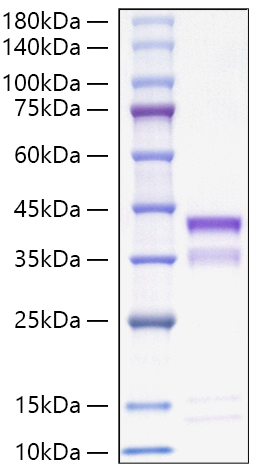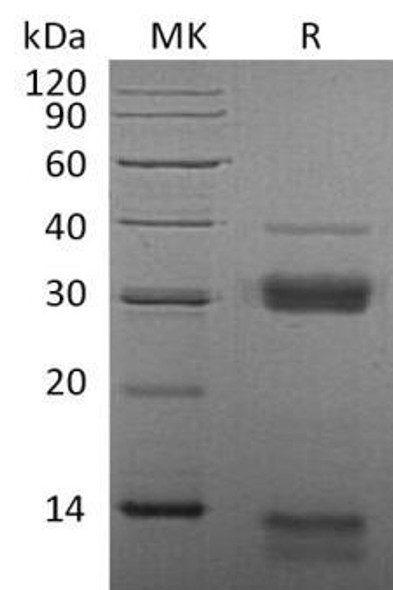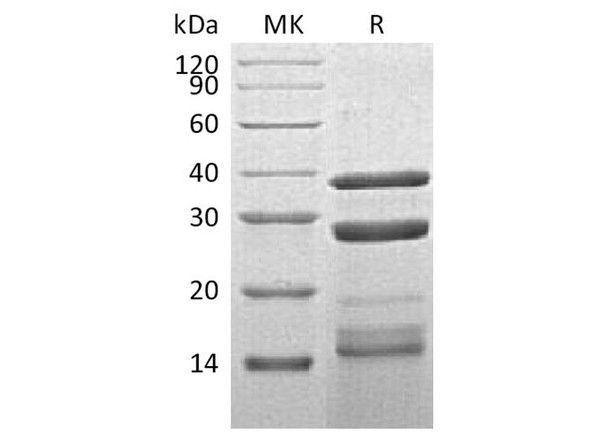Description
Recombinant Mouse Cathepsin S/CTSS Protein
The Recombinant Mouse Cathepsin S/CTSS Protein is a high-quality recombinant protein designed for murine biological research applications. This protein serves as an essential reagent in mouse model studies, comparative immunology research, and preclinical therapeutic evaluations, enabling scientists to investigate Cathepsin S/CTSS biology and its relevance to human disease mechanisms through translational research approaches.
This product (SKU: RPCB1133) is produced using HEK293 cells and features a C-His tag for convenient detection and purification. The protein exhibits a calculated molecular weight of 37.28 kDa with an observed molecular weight of 35-45 kDa under denaturing conditions, achieving ≥ 95 % as determined by SDS-PAGE.. Functional bioactivity has been validated through rigorous quality control assays, confirming its suitability for demanding research applications.
Key Features
| High Purity by Affinity Chromatography | |
| Mammalian & Bacterial Expression Systems | |
| High lot-to-lot consistency via strict QC |
| Product Name: | Recombinant Mouse Cathepsin S/CTSS Protein |
| SKU: | RPCB1133 |
| Size: | 10 μg , 20 μg |
| Reactivity: | Mouse |
| Synonyms: | Cathepsin S, Ctss, Cats, CTSS |
| Tag: | C-His |
| Expression Host: | HEK293 cells |
| Calculated MW: | 37.28 kDa |
| Observed MW: | 35-45 kDa |
| Gene ID: | 13040 |
| Protein Description: | High quality, high purity and low endotoxin recombinant Recombinant Mouse Cathepsin S/CTSS Protein (RPCB1133), tested reactivity in HEK293 cells and has been validated in SDS-PAGE.100% guaranteed. |
| Endotoxin: | < 0.1 EU/μg of the protein by LAL method. |
| Purity: | ≥ 95 % as determined by SDS-PAGE. |
| Formulation: | Lyophilized from a 0.22 μm filtered solution of PBS, pH 7.4. |
| Bio-Activity: | Measured by its ability to cleave the fluorogenic peptide substrate, Mca-RPKPVE- Nval-WRK(Dnp)-NH2 (RD,Catalog # ES002). The specific activity is >212 pmol/ min/μg. |
| Reconstitution: | Centrifuge the vial before opening. Reconstitute to a concentration of 0.1-0.5 mg/mL in sterile distilled water. Avoid vortex or vigorously pipetting the protein. For long term storage, it is recommended to add a carrier protein or stablizer (e.g. 0.1% BSA, 5% HSA, 10% FBS or 5% Trehalose), and aliquot the reconstituted protein solution to minimize free-thaw cycles. |
| Storage: | Store at -20℃.Store the lyophilized protein at -20℃ to -80 ℃ up to 1 year from the date of receipt. After reconstitution, the protein solution is stable at -20℃ for 3 months, at 2-8℃ for up to 1 week. |
Cathepsin S (CTSS), one of the lysosomal proteinases, has many important physiological functions in the nervous system, especially in process of extracellular matrix degradation and endocellular antigen presentation. Cathepsin S is expressed in the lysosome of antigen presenting cells, primarily dendritic cells, B-cells and macrophages. Cathepsin S is most well known for its critical function in the proteolytic digestion of the invariant chain chaperone molecules, thus controlling antigen presentation to CD4+ T-cells by major histocompatibility complex (MHC) class II molecules or to NK1.1+ T-cells via CD1 molecules. Cathepsin S also appears to participate in direct processing of exogenous antigens for presentation by MHC class II to CD4+ T-cells, or in cross-presentation by MHC class I molecules to CD8+ T-cells. In addition, it has been implicated in the pathogenesis of several diseases such as Alzheimer’s disease and degenerative disorders associated with the cells of the mononuclear phagocytic system.







